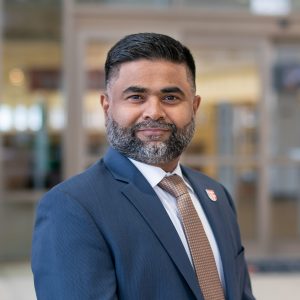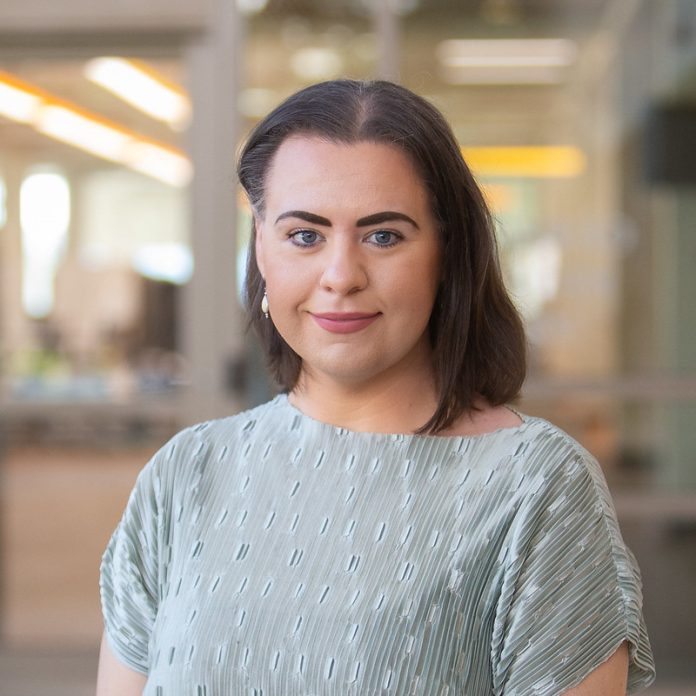Having added scholarships for a master’s degree in behavioral health fields to meet the growing need in the region, Jillian Woolard has come on board as director of the Impact Behavioral Health Grant at University of Texas Permian Basin.
The university received $10 million from the Permian Strategic Partnership and Scharbauer Foundation in July 2023. The grant, which is for five to six years, will allow UTPB to cover tuition and mandatory fees for graduate students majoring in clinical psychology, social work, counseling, or school counseling.
“My role is to, number one, bring the team together. That includes the academic side, the recruitment side, the financial aid side, the advancement side. Bring them all together to create common goals, strategies, and implementation for all of the objectives in the grant,” Woolard said. “I am also responsible for all the reporting and data tracking of the grant objectives and reporting those to our funders. I’m also responsible for taking the lead on the recruitment and engagement strategies for the grant.”
Another objective of the grant is to inform and educate the community on the importance of access to behavioral health in the region, and to pivot towards recruiting professionals to become licensed counselors, clinical social workers and psychological associates.
“It all kind of works in tandem. It’s going well. We have 52 students currently on scholarship, and our goal next fall is to increase that number from 50 to around 100 new students pursuing behavioral health careers at UTPB,” Woolard said.
Students have to be admitted to the graduate programs of their choosing.
“That process in itself helps us to identify students who are committed to serving the community, committed to doing the work to pursue licensure because degree completion and licensure are two different things, so they can earn a degree but that doesn’t mean they’re licensed, so they have to do the additional work and clinical hours and meet all the requirements in order to be licensed by the state. That’s our ultimate goal,” Woolard said.
Typically, it takes students two to three years to complete a master’s degree.
The new master of social work program is two years long and will be hybrid. The social work program will start in fall 2024.
“We’re going to be attracting students who prefer online coursework for that program, as well. That really does depend on how many credit hours a student would like to take each semester, so there’s some variability, but average to three years,” Woolard said.
The goal of the programs was to be able to fill the need at the behavioral health hospital that is in the process of being built between Odessa and Midland. The hospital is expected to open in 2025.
“We saw a need coming that had to be filled so we’re trying to meet that need with our efforts,” Woolard said.
She added that the need for mental health professionals is under reported.
“I think if the community had a deeper understanding of the breadth and scope of what behavioral workers do, and how they serve communities, I think there may be more response if people actually were aware of all the different needs and how all these professionals work in tandem to serve clients and patients,” Woolard said.
The first cohort would graduate in spring 2026.
Woolard wanted to send out a special thank-you to their funders, PSP and the Scharbauer Foundation for their generous donation to help make an impact on this area.
“We are going to do our very best to make sure their investment creates positive change in our communities,” she added.
Woolard grew up in Upstate New York near Buffalo and migrated to Texas in high school. She earned a bachelor’s degree in history and social science from Harding University in Searcy, Ark., and a master’s in business administration, also from Harding.
She was previously the director of dual credit at UT San Antonio.
”I have prior experience in growing capacity in academic programs, also with underserved populations. I have prior experience with grants. A lot of my prior work has helped me learn the skills and develop the knowledge to put the team together and to keep the team on track. Really, that’s my primary focus,” Woolard said.
When she first starts a job like this, she listens and learns, finds out what’s working, what they want to work but isn’t currently working and how they can bring those things together.
She likes to do an inventory of all the players and resources, a deep dive inventory on the project goals, all the expectations from every perspective that will be involved in the project and then try to find as many intersections, commonalities and win-wins, to start from.
“From there, we build a team, we identify goals we can all commit and invest to and with, and from there, we can start taking action towards achieving those goals. That’s usually my process,” Woolard said.

Raj Dakshinamurthy, Provost and Senior Vice President for Academic Affairs says Woolard is the right person for the job.
“With extensive educational background and experience as a teacher, Mrs. Woolard is well-equipped to work with internal and external stakeholders to ensure the Behavioral Health Grant program provides maximum benefit to students and community members. The primary objective of the program is to produce the next generation of behavioral health workers to meet the regional needs of West Texas. This objective will be achieved through clinical psychology, counseling, and upcoming social work graduate programs. Since joining UTPB, Mrs. Woolard has established a solid foundation for the program and continues to work with faculty and staff colleagues to serve students,” Dakshinamurthy said.
Woolard and her husband, James, have a daughter named Julia. They also have two dogs.
James works for an oilfield services company called Innospec.
“I’m really excited to be at UTPB. This opportunity came at the perfect time and I’m really, really invested, both professionally and personally in the mission of the grant and working towards increasing access to behavioral services for members of our communities through my work,” Woolard said.
She added that she could see the need for behavioral health with her dual credit students at UTSA.
“I can speak to that because the way that the landscape of dual credit has evolved, and just the K-12 landscape has evolved. The lines between college and high school are blurred. Students are expected to do more, with less time to achieve more with sometimes less resources. That creates a lot of challenges for them, many of which affect their mental health, their physical health. So I am aware and I do appreciate the need for every member of our community with populations I’ve worked with, prior dual credit students, undergrad students, the population I’m working with right now — graduate students and beyond,” Woolard said.




